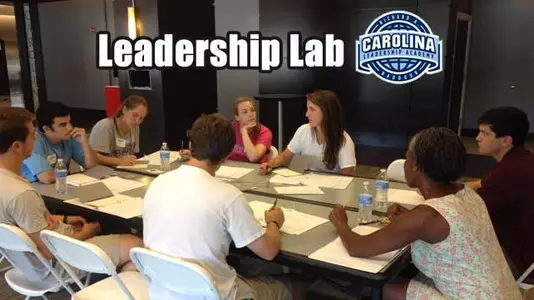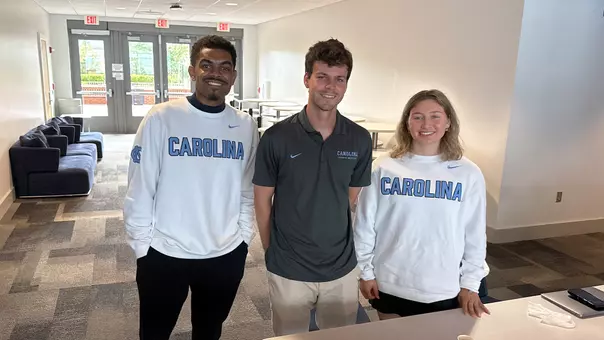University of North Carolina Athletics

Leadership Lab Launched
July 22, 2014 | Leadership Academy, Student-Athlete Development
The Richard A. Baddour Carolina Leadership Academy is the nation's premiere leadership training program for student-athletes and recently celebrated a decade of programming. The Leadership Academy continues its dynamic and innovative ways, as evidenced by the recent rebranding and reformulation of the program's third level of training, formerly the GAP Year Program and now known as the Leadership Lab.
Program Overview
The Richard A. Baddour Carolina Leadership Academy was founded in 2004 with three levels of student-athlete training: Carolina CREED for first-year students, Rising Stars for those who wish to advance their leadership training, and Veteran Leaders for each team's elite leaders. However, the Leadership Academy also has offered an additional level of leadership development for student-athletes and teams who have expressed that desire, providing further preparation before the high-level leadership application expected in Veteran Leaders.
"Leadership Lab is the dress rehearsal before the opening night that is Veteran Leaders," explains Leadership Academy Director Shelley Johnson. "The expectations we have of our Veteran Leaders are extremely high, and we've found that one more level of training can be very beneficial in cultivating even stronger leaders."
By the time participants reach the Leadership Lab as juniors, they have taken part in Carolina CREED as first years and then graduated from Rising Stars as sophomores. The third level is the smallest program within the Leadership Academy and is considered more niche than broad-based, appealing to student-athletes highly dedicated to their leadership development.
"Those who participate in the Leadership Lab tend to be highly motivated and particularly invested in their own leadership development," Johnson says. "This level is like the Marine Corps of the Leadership Academy: selective, agile, dedicated and highly trained."
The Leadership Lab offers the opportunity for continued leadership development through reflection and practical application. To accomplish this, the program adheres to the 70/20/10 Model of Leadership Development prescribed by the Center for Creative Leadership, headquartered in Greensboro, N.C.
The 70/20/10 Model refers to the ratio of time dedicated to leadership application, mentorship, and instruction. The instruction comes in the form of workshops, while a Leadership Project provides the mechanism for the mentorship and application. The Leadership Project aims to address a need expressed at the team, department, campus, or community levels.
Department staff members generously serve as mentors for the Leadership Project and to the student-athlete participants. It comes as little surprise that the student-athletes benefit from and are appreciative of the mentorship offered by the staff mentors; however, the Leadership Lab has been overwhelmed by mentors' engagement in the process.
"I really enjoyed the opportunity to talk with our student-athletes about marketing and ways they can optimize the impact of the project they're going to work on in Leadership Lab," said Michael Beale, UNC's Assistant A.D. for Marketing. "Their enthusiasm is infectious and I look forward to seeing the success they'll have in this program, as well as in the other facets of lives."
Impetus for Name Change
Two elements provided the inspiration for the name change and project redesign. The first came when Leadership Academy staffers attended the Wright Brothers Leadership Lab (WBLL) run by TechRide, an organization based in Knoxville, Tenn. The focus of WBLL was on innovation leadership as well as experiential learning. After two days of seminars and experiential learning, the Leadership Academy staff came away impressed with TechRide, and the feeling was mutual.
"The staff of the Carolina Leadership Academy is leading the innovation in their field," TechRide President Susannah Enkema says. "The culture of excellence the Carolina Leadership Academy fosters is outstanding."
The second bit of inspiration came from UNC's 1789 Venture Lab, a start-up incubator for young entrepreneurs. The Leadership Lab's summer Incubator provides a similar jumpstart on the program's Leadership Project as well as providing an "ecosystem for entrepreneurship."
"Just like in a science lab, the Leadership Lab offers participants a setting to address realistic leadership scenarios in a safe, controlled environment," Johnson says.
Origin of Program
The GAP Year program originated through a listening tour which the Leadership Academy conducted five years ago, in the summer of 2009. The goals of the listening tour were two-fold. One, it was intended to solicit additional feedback beyond the annual program evaluations from coaches, and two, it allowed the coaches an opportunity to share their teams' unique leadership needs with the Leadership Academy.
One of the teams to express this need was women's tennis. "We are fully committed to the Leadership Academy and we see the value and importance of it in our team's performance, so our staff and players wanted four years of leadership development," head coach Brian Kalbas says. "Because of the Leadership Academy, our team has seen record performances on and off the court."
The listening tour originated from the benchmarking partnership which the Leadership Academy has fostered with its leadership development counterpart at UNC's Kenan-Flagler Business School. The listening tour involved one question: what can the Leadership Academy do to better administer to a team's unique leadership needs?
"It has been a win-win for our two programs to share best practices," says Mindy Storrie, Director of Leadership Development at Kenan-Flagler. "Recently, we compared notes on business simulations and role-playing; both effective ways to provide students feedback in a safe environment. The Leadership Academy gives us ideas from their experience, and we offer some back. Both programs are better as a result."
During the process of the listening tour, a critical enough mass of coaches expressed their concern about having only three levels of programing in the Leadership Academy. They reasoned that if their student-athletes had four years of eligibility then there should be four years of formal leadership development programming offered.
"The GAP Year and now the Leadership Lab is an excellent example of how the Leadership Academy innovates," Johnson says. "It is about meeting the needs, wants and desires of its participants.
The following fall, the Leadership Academy piloted the GAP Year program, so named because it addressed a perceived gap in the programming provided at the time. The pilot for the program intended to carve out curriculum space in between the Rising Stars and Veteran Leaders programs, so as not to be a repeat of Rising Stars or to be Veteran Leaders before student-athletes actually participated in Veteran Leaders.
In subsequent years, more and more teams articulated the need for this level of programming. In effect, expressing their team's need became the password or secret handshake into the program - until 2013. That spring marked the first hard roll-out of the program when all teams were aware of the program's existence.
In the intervening years, the staff continued to hone and tweak a distinct curriculum which allowed for continued leadership reflection and practical application. They considered the soft roll-out in the first three years to be beta testing for the program. The year-end program evaluations proved pivotal in the research and development capacity.
Innovation
The Leadership Lab makes the most of student-athletes' time which is perpetually at a premium. More specifically, it rolls seven separate and salient opportunities into one program. In the course of the programming, participants receive authentic leadership development training, undertake project management, draft a rudimentary business plan, receive internship/work experience, go through a project incubator, perform community outreach, present a scaled-down thesis proposal and defense, and benchmark leadership development best practices.
"The Leadership Lab program offers an amazing opportunity to us as athletes," says Annie Harrison, a junior who is a member of the swimming and diving team. "It provides a way to deepen our own leadership skills while also gaining internship-like experience. Through working with experienced mentors we began to plan our main event, The Leadership Summit. The Summit will allow us to teach middle-school athletes some of what we have already learned while further developing our own unique leadership styles. We left the first day of the Incubator exchanging ideas and excited about continuing the process in the fall."
The condensed two-day format of the Incubator - as opposed to drawing the tasks out over several months - is even further evidence of mindfulness of the student-athletes' schedules. Each day of the event, the sessions are scheduled around team practices and individual training sessions.
The Incubator provides a vital element for the Leadership Lab. First and foremost, it serves as the application process for the program. Nominees must "survive" the Incubator to earn their roster spots.
Moreover, participating in the Incubator sets the nominees up to be in the very best possible position to succeed in the program and more specifically with the Leadership Project. As the name suggests, the Incubator allows a nugget of an idea for the Leadership Project to be developed to the extent which it can survive on its own. This sort of resource is the essence of innovation and entrepreneurship.
"Just as the aerospace company Lockheed had its Skunk Works Division, the Leadership Academy has the Leadership Lab to experiment and innovate with its programming elements," Johnson says. "We believe that this new format will prove to be exceptionally beneficial for UNC student-athletes, making the Leadership Academy an even more impactful part of the Carolina Experience."
For a video recap of Day 1 of the Leadership Lab Incubator, click here.





